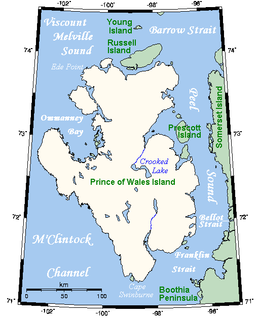Prince of Wales Island (Nunavut)

Prince of Wales Island, Nunavut.
|
|
 |
|
| Geography | |
|---|---|
| Location | Northern Canada |
| Coordinates | 72°40′N 99°00′W / 72.667°N 99.000°WCoordinates: 72°40′N 99°00′W / 72.667°N 99.000°W |
| Archipelago | Canadian Arctic Archipelago |
| Area | 33,339 km2 (12,872 sq mi) |
| Area rank | 40th |
| Highest elevation | 424 m (1,391 ft) |
| Highest point | 73°48′26″N 97°50′14″W / 73.80722°N 97.83722°W |
| Administration | |
|
Canada
|
|
| Territory | Nunavut |
| Demographics | |
| Population | Uninhabited |
One of the larger members of the Canadian Arctic Archipelago, Prince of Wales Island is an Arctic island in Nunavut, Canada, lying between Victoria Island and Somerset Island and south of the Queen Elizabeth Islands.
For administrative purposes it is divided between Qikiqtaaluk and Kitikmeot regions. There are no permanent settlements.
It is a low tundra-covered island with an irregular coastline deeply indented by Ommanney Bay in the west and Browne Bay in the east. Its area has been estimated at 33,339 km2 (12,872 sq mi). Prince of Wales Island is the world's 40th largest island and the 10th largest in Canada. Its highest known point—with an elevation of 424 m (1,391 ft)—is an unnamed spot at 73°48′26″N 97°50′14″W / 73.80722°N 97.83722°W in the island's far northeastern end, overlooking the Baring Channel, which separates the island from nearby Russell Island.
...
Wikipedia
